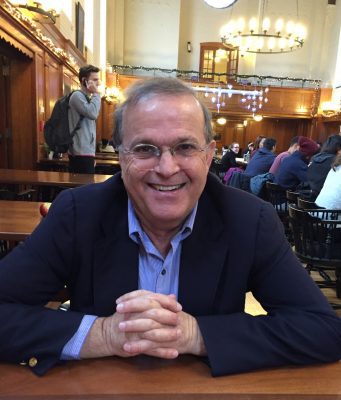
Professor Moshe Gai, the director of the Laboratory for Nuclear Science, aka the Astrophysics Laboratory, https://astro.uconn.edu, was awarded a 2024-2025 Fulbright US Scholar Award to teach and do research in Romania. He will spend five months at the newly constructed world highest power laser lab (10 PW), the Extreme Light Infrastructure Nuclear Physics (ELI-NP), recently constructed by the EU in Bucharest, where Prof. Gai plans to apply expertise he gained working at Duke University for using Time Projection Chamber (TPC) detectors with gamma-beams to study stellar process in the lab.
Awards
Reports on awards, grants, and other forms of recognition received by members of the Physics Department.
Nobel Prize Winner, Professor Adam Riess, Katzenstein Distinguished Lecturer
The University of Connecticut, Department of Physics is proud to announce the 26th Annual Katzenstein Distinguished Lecturer that will be on Friday, November 15th. For the details of the lecture see the Web Calendar post.
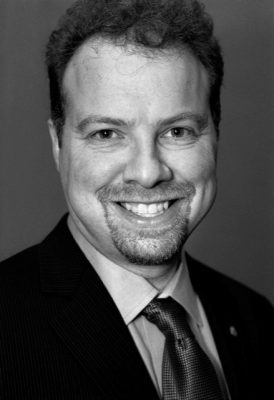 Adam Riess is a Bloomberg Distinguished Professor, the Thomas J. Barber Professor in Space Studies at the Krieger School of Arts and Sciences at Johns Hopkins University, a distinguished astronomer at the Space Telescope Science Institute and a member of the National Academy of Sciences. He received his bachelor’s degree in physics from the Massachusetts Institute of Technology in 1992 and his PhD from Harvard University in 1996. His research involves measurements of the cosmological framework with supernovae (exploding stars) and Cepheids (pulsating stars). Currently, he leads the SHOES Team in efforts to improve the measurement of the Hubble Constant and the Higher-z Team to find and measure the most distant type Ia supernovae known to probe the origin of cosmic acceleration.
Adam Riess is a Bloomberg Distinguished Professor, the Thomas J. Barber Professor in Space Studies at the Krieger School of Arts and Sciences at Johns Hopkins University, a distinguished astronomer at the Space Telescope Science Institute and a member of the National Academy of Sciences. He received his bachelor’s degree in physics from the Massachusetts Institute of Technology in 1992 and his PhD from Harvard University in 1996. His research involves measurements of the cosmological framework with supernovae (exploding stars) and Cepheids (pulsating stars). Currently, he leads the SHOES Team in efforts to improve the measurement of the Hubble Constant and the Higher-z Team to find and measure the most distant type Ia supernovae known to probe the origin of cosmic acceleration.
In 2011, he was named a co-winner of the Nobel Prize in Physics and was awarded the Albert Einstein Medal for his leadership in the High-z Supernova Search Team’s discovery that the expansion rate of the universe is accelerating, a phenomenon widely attributed to a mysterious, unexplained “dark energy” filling the universe. The discovery was named by Science magazine in 1998 as “the Breakthrough Discovery of the Year.” His accomplishments have been recognized with a number of other awards, including a MacArthur Fellowship in 2008, the Gruber Foundation Cosmology Prize in 2007 (shared), and the Shaw Prize in Astronomy in 2006.
Professor Nora Berrah Elected to National Academy of Sciences
Sarah Al-Arshani, UConn Today, May 3, 2024
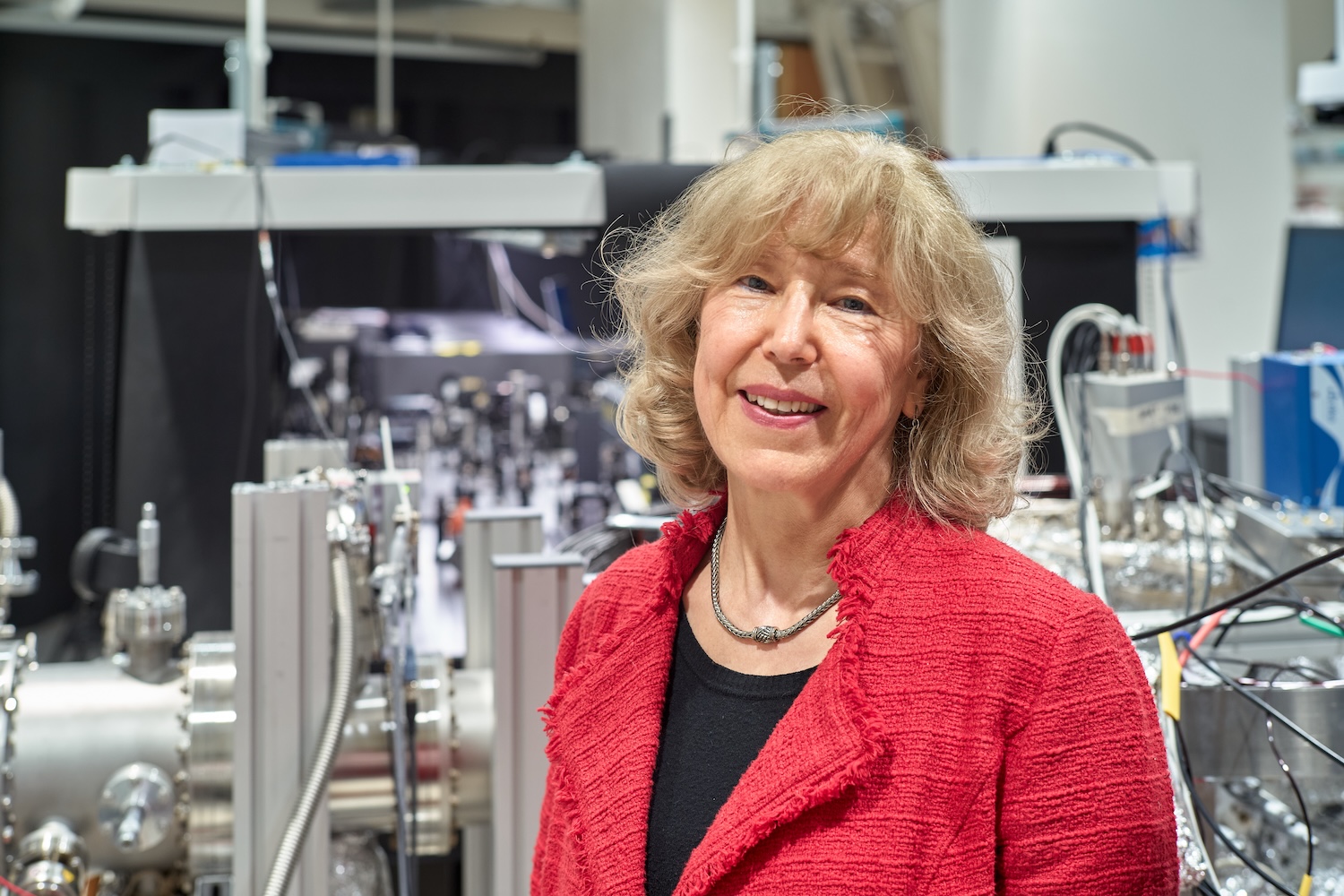
UConn physics professor Nora Berrah has been elected as a member of the National Academy of Science (NAS), becoming the fifth member from the UConn community to join the selective national society.
The Society was established in 1863 by an Act of Congress and signed into law by former President Abraham Lincoln as a private, nongovernmental institution.
Members are elected “in recognition of their distinguished and continuing achievements in original research,” and the academy serves as an advisory board for the nation on issues relating to science and technology.
As a member of NAS, Berrah joins professor of economics Kathy Segerson, Dr. Cato Laurencin, Chief Executive Officer of The Connecticut Convergence Institute for Translation in Regenerative Engineering at UConn Health; Laurinda Jaffe, department chair and professor of cell biology at UConn Health; Dr. Se-Jin Lee, Presidential Distinguished Professor in the Department of Genetics and Genome Sciences at UConn Health; Mary Jane Osborn, professor of microbiology who died in 2019; and Henry N. Andrews, professor of botany who died in 2002.
“Membership in the NAS is one of the highest honors that can be given to a scientist,” says Ofer Harel, Interim Dean of the College of Liberal Arts and Sciences. “It is a recognition by peers and the academy of outstanding research achievements, and Nora absolutely falls into that category.”
Current academy members must nominate and vote for new members to join the academy, with no more than 120 members being elected each year.
“It’s just an unbelievably great honor,” says Berrah. “I feel very grateful for all the National Academy members who voted for me and for being elected.”
Berrah, the former department head of physics from 2014 to 2018, was elected in recognition of her research that focuses on ultrafast physical and chemical processes in quantum systems.
Berrah’s research has wide ranging impact
In her lab on campus, as well as at the Linac Coherent Light Source Free Electron Laser at SLAC National Accelerator Laboratory in Stanford, California, Berrah conducts “time resolved, photo-induced experiments to understand ultrafast fundamental mechanisms such as charge transfer, energy transfer, and proton transfer.”
The experiments measure super-fast reactions up to the femtosecond, or one quadrillionth of a second, as well as to the attosecond, or one quintillionth of a second which has important impacts on other scientific fields.
“We want to understand these processes, and ultimately we want to control them to achieve desired outcomes,” says Berrah. “I and my research group measure manifestations of quantum mechanics — using ultrafast lasers at the femtosecond and attosecond timescale to test fundamentals of quantum mechanics. Our research has a broad impact on chemistry, biology, material science, and environmental science.”
Berrah was also previously elected to the American Academy of Arts and Sciences and is a fellow of the American Association for the Advancement of Science. She earned a Davisson-Germer award from the American Physical Society and is a fellow of the American Physical Society.
She has also been an advocate for increasing the participation and retention of women in physics.
“I realized as an undergraduate student that there were just very few women, whether they’re undergraduate or graduate students, and it doesn’t make sense to me, because we all have a brain, and if we have an interest in physics, then we should pursue it,” says Berrah. “It’s a man-dominated field. And way back, women were not welcomed in physics.”
Over the course of her career, Berrah has worked to help women feel less isolated in the field, including serving as the chair of APS’ Committee on the Status of Women in Physics.
Berrah is currently chairing a committee in the physics department to organize a conference for undergraduate women and gender minorities in physics, that she says will occur January 24-26, 2025. She says it is an opportunity to help undergraduate women network and peer mentor with each other, so they don’t feel isolated, since they are often the only women in their classrooms.
The conference is a chance for women to learn together and become comfortable in the field, Berrah says.
“It’s important to mentor the next generation of women physicists and increase significantly their number,” says Berrah.
2024 Sigma Pi Sigma Honors Society Celebration!
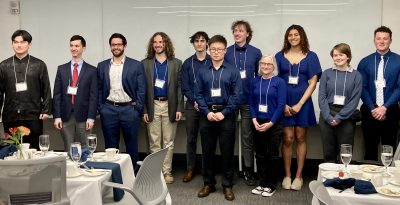
2024 Sigma Pi Sigma Honors Society Inductees:
- Daniel Baker
- Rachel Cleveland
- Jack Conley
- Grace Farrell
- William Livesayand
- Patrick McGovern
- Kabir Sewrathan
- Teddy Smith
- Jefferson Tang
- Thomas Tarutin
- Nicholas Thiel-Hudson
- Joseph Van Vlack
- Elic Wu
The initiation ceremony was held on Friday, April 26th. The event began at 3:00 with a pre-colloquium reception, followed by the colloquium at 4:00 in GW-002 and by the banquet and initiation ceremony at 6:00.
Two physics undergrads among 2024 University Scholars
Two of UConn Physics Department’s undergrads, Rachel Cleveland and Nicholas Thiel-Hudson, have been recently selected as part of the 2024 cohort of UConn University Scholars! These students were selected based on the strength of their proposal. Graduation as a University Scholar recognizes a student’s extraordinary engagement with self-reflective learning and research or creative endeavors.
Rachel Cleveland
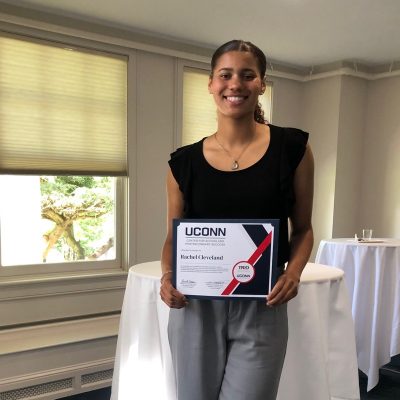
Major: Physics
Project Title: Determining the Parameters that Drive the Co-evolution of Black Holes and Galaxies
Committee: Daniel Angles-Alcazar, Physics; Cara Battersby, Physics; Lea Ferreira dos Santos, Physics
Project Summary: Cosmological simulations are incredibly useful tools for astrophysicists. They allow a deeper exploration of celestial phenomena and reveal their intricate workings. In the past, I have observed patterns between black holes and their host galaxies using SIMBA simulations. I now plan to enhance my research by transitioning to the CAMELS simulation. This offers the flexibility to manipulate various cosmological parameters, which brings the promise of uncovering the fundamental drivers behind my previously observed trends. This endeavor will help advance our understanding of the cosmos.
Rachel Cleveland is a junior honors student from Windsor, CT pursuing a major in Physics and a minor in Mathematics and Statistics. She is a McNair Scholar, Presidential Scholar, and Babbidge Scholar at UConn. She plans to attend a PhD program after graduation.
Nicholas Thiel-Hudson
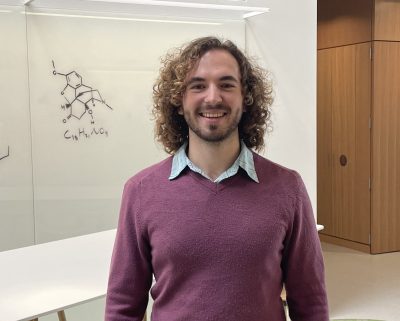
Major: Physics and Music
Project title: Rare-Earth Manganites for CO2 Reduction and Quantum Sensing
Committee: Dr. Menka Jain, Physics; Dr. Peter Schweitzer, Physics; and Dr. Ronald Squibbs, Music
Project Summary: Lanthanum strontium manganite (LSMO) is a solid-state material that exhibits particularly interesting electrical and magnetic properties. This makes LSMO a good candidate for use in advanced technologies, however, it is very difficult to make. This project will investigate novel synthesis methods to fabricate LSMO powders and films for two different applications. Powders will be optimized for use as a selective electrocatalyst in the conversion of carbon dioxide into usable hydrocarbon products. Films will be optimized for use in quantum sensing, which is useful for advanced technologies.
Nicholas Thiel-Hudson, from New Fairfield, CT, is a Presidential Scholar pursuing dual degrees in Physics and Music. In his free time, he enjoys playing the violin and listening to music from around the world. Nicholas is also an avid weightlifter and occasional rock climber.
For the list of all 2024 University Scholars, visit University Scholars Program website.
2023 HEAD Early-Career Prize is awarded to Prof. Mingarelli
The 2023 High Energy Astrophysics Division’s Early-Career Prize is awarded to Dr. Chiara Mingarelli for her leadership in the analysis of pulsar timing array data and her contributions to our understanding of the stochastic gravitational wave background.
For more information about the Prize, see https://head.aas.org/awards/earlycareer/earlycareer.prize.html
Prof. McCarron received a grant from Air Force Office of Scientific Research
Daniel McCarron, a physics professor, received a grant from the Air Force Office of Scientific Research for his work analyzing the quantum mechanical behavior of a simple hydrocarbon molecule: CH, or methylidyne. A highly reactive gas, methylidyne is abundant in the interstellar medium, and its simple composition promises to allow researchers to study the role of quantum mechanics within organic chemistry.
In order to expose the quantum nature of these molecules, Prof. McCarron has devised a way to cool them down to a millionth of a degree above absolute zero using laser light. At such a low temperature, “quantum effects are amplified and can reveal themselves in the lab,” he says. “You don’t really get that in a beaker at room temperature – things just happen too quickly and too chaotically.”
The AFOSR is funding the purchase of a high-powered laser to assist in slowing down beams of CH radicals from about 100 meters per second to several centimeters per second. This laser-cooling and trapping technology will allow amplifying and better study of the quantum behavior of this organic molecule, with an eye toward furthering scientific knowledge about the role of quantum mechanics in chemical reactions in general—a field where successful research has been scarce.
For more information: Four UConn Researchers Take DoD University Research Equipment Awards
CT Space Grant Award for Andrea Mejia
Second-year graduate student Andrea Mejia received in Fall 2022 the CT Space Grant Award for her Graduate Research on “Constraining Black Hole Binaries and Mergers” where she studies, by means of numerical simulations, how Active Galactic Nuclei form and eventually merge stellar mass black hole binaries, see https://ctspacegrant.org/funding-programs/faculty/past-recipients. In addition, Andrea successfully secured in May 2023 an ACCESS Explore Grant. These grants are designed specifically for graduate students in need of advanced computing and data resources for research purposes. Andrea’s grant provides 716,800 cpu-hours on high-performance computing systems to be used by May 2024. Originating from Andrea’s undergraduate research at her prior institution, Hunter College, this well-funded research will help to interpret data on gravitational waves from black hole mergers observed by LIGO and VIRGO. For her graduate studies at UConn, however, Andrea plans to pursue a different career path and switch from mergers of stellar mass black holes in theoretical astrophysics to collisions of subatomic particles in theoretical particle and nuclear physics.
Prof. Mingarelli is the runner up of Inspiring Women in Science awards
Prof. Chiara Mingarelli is the Inspiring Women in Science awards 2022 Scientific Achievement Runner-Up.
The Inspiring Women in Science awards celebrate and support the achievements of women in science, and all those who work to encourage girls and young women to engage with STEM subjects and stay in STEM careers around the world.
For more information read the press release
NSF award to Profs. Jain and Sochnikov
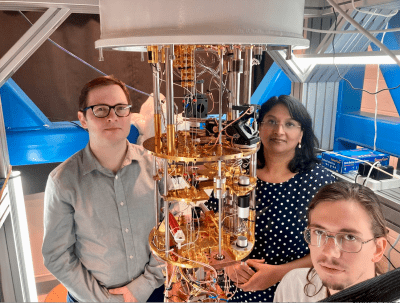 Professors Jain and Sochnikov received NSF research grant entitled “New Quantum Elastocaloric Demagnetization Refrigeration for the Millikelvin Range”. A major focus of their research will be the cooling of quantum chips. For this purpose, their teams will study ‘spin liquids’, which can be harnessed to achieve millikelvin temperatures without magnetic fields. At such low temperatures, quantum phase transitions drive cryocooling. This research uses novel techniques to induce and tune these types of phase transitions. In the future, this research will transform our ability to build energy-efficient, large-scale quantum computers.
Professors Jain and Sochnikov received NSF research grant entitled “New Quantum Elastocaloric Demagnetization Refrigeration for the Millikelvin Range”. A major focus of their research will be the cooling of quantum chips. For this purpose, their teams will study ‘spin liquids’, which can be harnessed to achieve millikelvin temperatures without magnetic fields. At such low temperatures, quantum phase transitions drive cryocooling. This research uses novel techniques to induce and tune these types of phase transitions. In the future, this research will transform our ability to build energy-efficient, large-scale quantum computers.